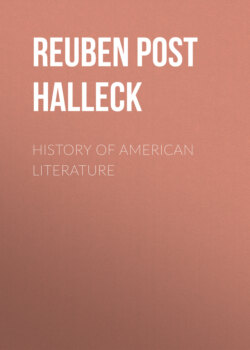Читать книгу History of American Literature - Reuben Post Halleck - Страница 28
На сайте Литреса книга снята с продажи.
THE EMERGENCE OF A NATION
ОглавлениеPROGRESS TOWARD NATIONALITY.—The French and Indian War, which began in 1754, served its purpose in making the colonists feel that they were one people. At this time most of them were living on the seacoast from Georgia to Maine, and had not yet even crossed the great Appalachian range of mountains. The chief men of one colony knew little of the leaders in the other colonies. This war made George Washington known outside of Virginia. There was not much interchange of literature between the two leading colonies, Virginia and Massachusetts. Prior to this time, the other colonies had not produced much that had literary value. No national literature could be written until the colonists were welded together.
The French and Indian War, which decided whether France or England was to be supreme in America, exposed the colonists to a common danger. They fought side by side against the French and Indians, and learned that the defeat of one was the defeat of all. After a desperate struggle France lost, and the Anglo-Saxon race was dominant on the new continent. By the treaty of Paris, signed in 1763, England became the possessor of Canada and the land east of the Mississippi River.
THE REVOLUTION.—All of the colonies had been under English rule, although they had in large part managed in one way or another to govern themselves. At the close of the French and Indian War, the colonists had not thought of breaking away from England, although they had learned the lesson of union against a common foe. George III. came to the throne in 1760. By temperament he was unusually adapted to play his part in changing the New World's history. He was determined to rule according to his own personal inclinations. He dominated his cabinet and controlled Parliament by bribery. He decided that the American colonies should feel the weight of his authority, and in 1763 his prime minister, George Grenville, undertook to execute measures in restraint of colonial trade. Numbers of commodities, like tobacco, for instance, could not be traded with France or Spain or Holland, but must be sent to England. If there was any profit to be made in selling goods to foreign nations, England would make that profit. He also planned to tax the colonists and to quarter British troops among them. These measures aroused the colonies to armed resistance and led to the Revolutionary War, which began in 1775.
Freneau (p. 96), a poet of the Revolution, thus expresses in verse some of these events:—
"When a certain great king, whose initial is G,
Shall force stamps upon paper and folks to drink tea;
When these folks burn his tea and stampt paper like stubble,
You may guess that this king is then coming to trouble."
